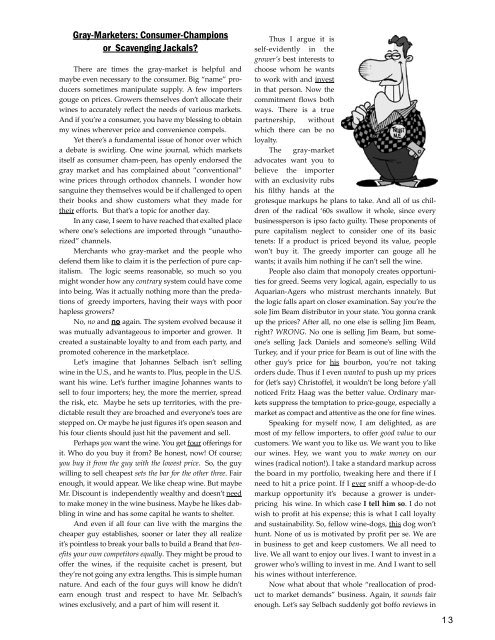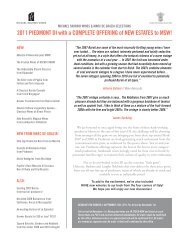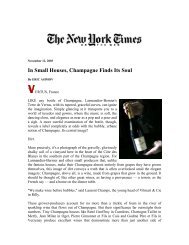German Catalog 2006 USE THIS ONE.qxp - Michael Skurnik Wines
German Catalog 2006 USE THIS ONE.qxp - Michael Skurnik Wines
German Catalog 2006 USE THIS ONE.qxp - Michael Skurnik Wines
You also want an ePaper? Increase the reach of your titles
YUMPU automatically turns print PDFs into web optimized ePapers that Google loves.
Gray-Marketers: Consumer-Champions<br />
or Scavenging Jackals?<br />
There are times the gray-market is helpful and<br />
maybe even necessary to the consumer. Big “name” producers<br />
sometimes manipulate supply. A few importers<br />
gouge on prices. Growers themselves don’t allocate their<br />
wines to accurately reflect the needs of various markets.<br />
And if you’re a consumer, you have my blessing to obtain<br />
my wines wherever price and convenience compels.<br />
Yet there’s a fundamental issue of honor over which<br />
a debate is swirling. One wine journal, which markets<br />
itself as consumer cham-peen, has openly endorsed the<br />
gray market and has complained about “conventional”<br />
wine prices through orthodox channels. I wonder how<br />
sanguine they themselves would be if challenged to open<br />
their books and show customers what they made for<br />
their efforts. But that’s a topic for another day.<br />
In any case, I seem to have reached that exalted place<br />
where one’s selections are imported through “unauthorized”<br />
channels.<br />
Merchants who gray-market and the people who<br />
defend them like to claim it is the perfection of pure capitalism.<br />
The logic seems reasonable, so much so you<br />
might wonder how any contrary system could have come<br />
into being. Was it actually nothing more than the predations<br />
of greedy importers, having their ways with poor<br />
hapless growers?<br />
No, no and no again. The system evolved because it<br />
was mutually advantageous to importer and grower. It<br />
created a sustainable loyalty to and from each party, and<br />
promoted coherence in the marketplace.<br />
Let’s imagine that Johannes Selbach isn’t selling<br />
wine in the U.S., and he wants to. Plus, people in the U.S.<br />
want his wine. Let’s further imagine Johannes wants to<br />
sell to four importers; hey, the more the merrier, spread<br />
the risk, etc. Maybe he sets up territories, with the predictable<br />
result they are broached and everyone’s toes are<br />
stepped on. Or maybe he just figures it’s open season and<br />
his four clients should just hit the pavement and sell.<br />
Perhaps you want the wine. You get four offerings for<br />
it. Who do you buy it from? Be honest, now! Of course;<br />
you buy it from the guy with the lowest price. So, the guy<br />
willing to sell cheapest sets the bar for the other three. Fair<br />
enough, it would appear. We like cheap wine. But maybe<br />
Mr. Discount is independently wealthy and doesn’t need<br />
to make money in the wine business. Maybe he likes dabbling<br />
in wine and has some capital he wants to shelter.<br />
And even if all four can live with the margins the<br />
cheaper guy establishes, sooner or later they all realize<br />
it’s pointless to break your balls to build a Brand that benefits<br />
your own competitors equally. They might be proud to<br />
offer the wines, if the requisite cachet is present, but<br />
they’re not going any extra lengths. This is simple human<br />
nature. And each of the four guys will know he didn’t<br />
earn enough trust and respect to have Mr. Selbach’s<br />
wines exclusively, and a part of him will resent it.<br />
Thus I argue it is<br />
self-evidently in the<br />
grower’s best interests to<br />
choose whom he wants<br />
to work with and invest<br />
in that person. Now the<br />
commitment flows both<br />
ways. There is a true<br />
partnership, without<br />
which there can be no<br />
loyalty.<br />
The gray-market<br />
advocates want you to<br />
believe the importer<br />
with an exclusivity rubs<br />
his filthy hands at the<br />
grotesque markups he plans to take. And all of us children<br />
of the radical ‘60s swallow it whole, since every<br />
businessperson is ipso facto guilty. These proponents of<br />
pure capitalism neglect to consider one of its basic<br />
tenets: If a product is priced beyond its value, people<br />
won’t buy it. The greedy importer can gouge all he<br />
wants; it avails him nothing if he can’t sell the wine.<br />
People also claim that monopoly creates opportunities<br />
for greed. Seems very logical, again, especially to us<br />
Aquarian-Agers who mistrust merchants innately. But<br />
the logic falls apart on closer examination. Say you’re the<br />
sole Jim Beam distributor in your state. You gonna crank<br />
up the prices? After all, no one else is selling Jim Beam,<br />
right? WRONG. No one is selling Jim Beam, but someone’s<br />
selling Jack Daniels and someone’s selling Wild<br />
Turkey, and if your price for Beam is out of line with the<br />
other guy’s price for his bourbon, you’re not taking<br />
orders dude. Thus if I even wanted to push up my prices<br />
for (let’s say) Christoffel, it wouldn’t be long before y’all<br />
noticed Fritz Haag was the better value. Ordinary markets<br />
suppress the temptation to price-gouge, especially a<br />
market as compact and attentive as the one for fine wines.<br />
Speaking for myself now, I am delighted, as are<br />
most of my fellow importers, to offer good value to our<br />
customers. We want you to like us. We want you to like<br />
our wines. Hey, we want you to make money on our<br />
wines (radical notion!). I take a standard markup across<br />
the board in my portfolio, tweaking here and there if I<br />
need to hit a price point. If I ever sniff a whoop-de-do<br />
markup opportunity it’s because a grower is underpricing<br />
his wine. In which case I tell him so. I do not<br />
wish to profit at his expense; this is what I call loyalty<br />
and sustainability. So, fellow wine-dogs, this dog won’t<br />
hunt. None of us is motivated by profit per se. We are<br />
in business to get and keep customers. We all need to<br />
live. We all want to enjoy our lives. I want to invest in a<br />
grower who’s willing to invest in me. And I want to sell<br />
his wines without interference.<br />
Now what about that whole “reallocation of product<br />
to market demands” business. Again, it sounds fair<br />
enough. Let’s say Selbach suddenly got boffo reviews in<br />
13
















